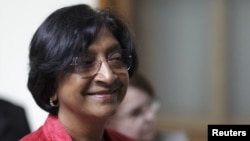HARARE - United Nations High Commissioner for Human Rights Navi Pillay has begun a five-day visit to Zimbabwe at the invitation of President Robert Mugabe. The president invited the U.N. human rights chief in hopes of clearing his government, which for years has been accused of being a gross violator of human rights. Civil society groups say Pillay will not see Zimbabwe's actual human rights situation during her visit.
Pillay, a former South African High Court judge who also has served on the International Criminal Court, arrived in Zimbabwe late Sunday.
She summed up her mission by saying, "It is very, very important that the government has invited [the] U.N. commissioner for human rights. I am here to assess the human rights situation and to see how the United Nations can help to advance human protection here," she said.
However, civil society groups say they were shocked to hear the government had drawn up a list of organizations it had cleared to meet the U.N. human rights chief.
Abel Chikomo is a representative of non-governmental organizations that deal with issues of human rights in Zimbabwe.
"Genuine CSOs [community service organizations] will not be commandeered by government to a stage-managed civil society meeting with the high commissioner, which is organized by the government. Neither will we legitimize a fraudulent exercise meant to give the U.N. human rights chief a superficial picture of our country’s human rights situation," said Chikomo.
Irene Petras is the head of Zimbabwe Lawyers for Human Rights. She said Pillay's visit to Zimbabwe is different compared to visits in other countries.
"We do understand from previous missions that the commissioner has gone on that there are meetings with the civil society and those meetings are not organized by the government. So [where] we have a problem is we were given the mandate to organize our meeting with the U.N. commissioner and from nowhere that mandate has been removed from us by the ministry of justice," said Petras.
Zimbabwe’s human rights record has remained on the international radar for more than a decade, since Mugabe and his supporters began forcing white farm owners off their land in 2000.
In the early 2000s, the United States, Britain and other countries imposed sanctions on Mugabe and ZANU-PF party leaders following reports of election rigging and suppression of the opposition.
The sanctions have expanded since then, as accusations of more human rights violations pile up against the president and his supporters.
In 2009, the government barred entry to U.N. rights investigator Manfred Nowak, who had flown into Zimbabwe for meetings with activists.
Many have seen the invitation of the U.N. human rights chief as an attempt by Mugabe to clear his name as his political career approaches its twilight years.
The president is 88-years-old.
Zimbabwe is due to hold elections some time in the next year, if issues surrounding a new constitution can be worked out.









